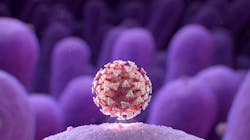A new Cleveland Clinic study has identified genetic factors that may influence susceptibility to COVID-19, which could guide personalized treatment. In this study, a team of researchers led by Feixiong Cheng, PhD, Genomic Medicine Institute, investigated genetic susceptibility to COVID-19 by examining DNA polymorphisms (variations in DNA sequences) in the ACE2 and TMPRSS2 genes. ACE2 and TMPRSS2 produce enzymes (ACE2 and TMPRSS2, respectively) that enable the virus to enter and infect human cells.
Looking at ~81,000 human genomes from three genomic databases, they found 437 non-synonymous single-nucleotide variants in the protein-coding regions of ACE2 and TMPRSS2. They identified multiple potentially deleterious polymorphisms in both genes (63 in ACE2; 68 in TMPRSS2) that offer potential explanations for different genetic susceptibility to COVID-19, as well as for risk factors.
Several ACE2 variants were found to be associated with cardiovascular and pulmonary conditions by potentially altering the angiotensinogen-ACE2 interaction. In addition, germline deleterious variants in the coding region of TMPRSS2, a key gene in prostate cancer, were found to occur in different cancer types, suggesting that oncogenic roles of TMPRSS2 may be linked to poor outcomes with COVID-19.
These findings demonstrate a possible association between ACE2 and TMPRSS2 polymorphisms and COVID-19 susceptibility and indicate that a systematic investigation of the functional polymorphisms in ACE2 and TMPRSS2 among different populations could pave the way for precision medicine and personalized treatment strategies for COVID-19. However, all investigations in this study were performed in general populations, not with COVID-19 patient genetic data. Therefore, Dr. Cheng calls for a human genome initiative to validate his findings and to identify new clinically actionable variants to accelerate precision medicine for COVID-19.
A proposed pharmacogenomics model of potential combination therapies (i.e., hydroxychloroquine, E-64D (a protease inhibitor), and camostat mesylate (an approved TMPRSS2 for treatment of chronic pancreatitis in Japan) for COVID-19 by blocking ACE2 and TMPRSS2 across different populations with three genotypes.
“Because we currently have no approved drugs for COVID-19, repurposing already approved drugs could be an efficient and cost-effective approach to developing prevention and treatment strategies,” Dr. Cheng said. “The more we know about the genetic factors influencing COVID-19 susceptibility, the better we will be able to determine the clinical efficacy of potential treatments.”

